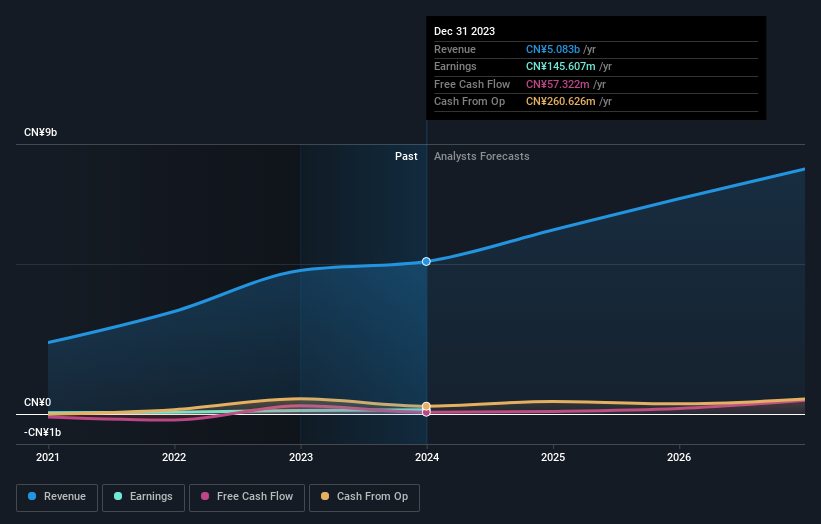Insiders still own 67% of Luyuan Group Holding (Cayman) Limited (HKG:2451) despite recent sales

Key Insights
- Luyuan Group Holding (Cayman)'s significant insider ownership suggests inherent interests in company's expansion
- 61% of the business is held by the top 2 shareholders
- Insiders have been selling lately
To get a sense of who is truly in control of Luyuan Group Holding (Cayman) Limited (HKG:2451), it is important to understand the ownership structure of the business. And the group that holds the biggest piece of the pie are individual insiders with 67% ownership. That is, the group stands to benefit the most if the stock rises (or lose the most if there is a downturn).
Even though insiders have sold shares recently, the group owns the most numbers of shares in the company and as a result benefitted the most after market cap rose HK$303m last week.
Let's delve deeper into each type of owner of Luyuan Group Holding (Cayman), beginning with the chart below.
View our latest analysis for Luyuan Group Holding (Cayman)

What Does The Lack Of Institutional Ownership Tell Us About Luyuan Group Holding (Cayman)?
Small companies that are not very actively traded often lack institutional investors, but it's less common to see large companies without them.
There could be various reasons why no institutions own shares in a company. Typically, small, newly listed companies don't attract much attention from fund managers, because it would not be possible for large fund managers to build a meaningful position in the company. Alternatively, there might be something about the company that has kept institutional investors away. Institutional investors may not find the historic growth of the business impressive, or there might be other factors at play. You can see the past revenue performance of Luyuan Group Holding (Cayman), for yourself, below.

Luyuan Group Holding (Cayman) is not owned by hedge funds. From our data, we infer that the largest shareholder is Jie Ni (who also holds the title of Top Key Executive) with 31% of shares outstanding. Its usually considered a good sign when insiders own a significant number of shares in the company, and in this case, we're glad to see a company insider play the role of a key stakeholder. Meanwhile, the second and third largest shareholders, hold 31% and 5.4%, of the shares outstanding, respectively. Interestingly, the second-largest shareholder, Jihong Hu is also Chief Executive Officer, again, pointing towards strong insider ownership amongst the company's top shareholders.
After doing some more digging, we found that the top 2 shareholders collectively control more than half of the company's shares, implying that they have considerable power to influence the company's decisions.
While it makes sense to study institutional ownership data for a company, it also makes sense to study analyst sentiments to know which way the wind is blowing. There are plenty of analysts covering the stock, so it might be worth seeing what they are forecasting, too.
Insider Ownership Of Luyuan Group Holding (Cayman)
While the precise definition of an insider can be subjective, almost everyone considers board members to be insiders. Management ultimately answers to the board. However, it is not uncommon for managers to be executive board members, especially if they are a founder or the CEO.
Most consider insider ownership a positive because it can indicate the board is well aligned with other shareholders. However, on some occasions too much power is concentrated within this group.
Our most recent data indicates that insiders own the majority of Luyuan Group Holding (Cayman) Limited. This means they can collectively make decisions for the company. Given it has a market cap of HK$3.0b, that means they have HK$2.0b worth of shares. Most would be pleased to see the board is investing alongside them. You may wish todiscover (for free) if they have been buying or selling.
General Public Ownership
With a 30% ownership, the general public, mostly comprising of individual investors, have some degree of sway over Luyuan Group Holding (Cayman). This size of ownership, while considerable, may not be enough to change company policy if the decision is not in sync with other large shareholders.
Private Company Ownership
We can see that Private Companies own 3.6%, of the shares on issue. It's hard to draw any conclusions from this fact alone, so its worth looking into who owns those private companies. Sometimes insiders or other related parties have an interest in shares in a public company through a separate private company.
Next Steps:
I find it very interesting to look at who exactly owns a company. But to truly gain insight, we need to consider other information, too. Consider for instance, the ever-present spectre of investment risk. We've identified 2 warning signs with Luyuan Group Holding (Cayman) (at least 1 which can't be ignored) , and understanding them should be part of your investment process.
If you are like me, you may want to think about whether this company will grow or shrink. Luckily, you can check this free report showing analyst forecasts for its future.
NB: Figures in this article are calculated using data from the last twelve months, which refer to the 12-month period ending on the last date of the month the financial statement is dated. This may not be consistent with full year annual report figures.
New: AI Stock Screener & Alerts
Our new AI Stock Screener scans the market every day to uncover opportunities.
• Dividend Powerhouses (3%+ Yield)
• Undervalued Small Caps with Insider Buying
• High growth Tech and AI Companies
Or build your own from over 50 metrics.
Have feedback on this article? Concerned about the content? Get in touch with us directly. Alternatively, email editorial-team (at) simplywallst.com.
This article by Simply Wall St is general in nature. We provide commentary based on historical data and analyst forecasts only using an unbiased methodology and our articles are not intended to be financial advice. It does not constitute a recommendation to buy or sell any stock, and does not take account of your objectives, or your financial situation. We aim to bring you long-term focused analysis driven by fundamental data. Note that our analysis may not factor in the latest price-sensitive company announcements or qualitative material. Simply Wall St has no position in any stocks mentioned.
Have feedback on this article? Concerned about the content? Get in touch with us directly. Alternatively, email editorial-team@simplywallst.com
About SEHK:2451
Luyuan Group Holding (Cayman)
Through its subsidiaries, engages in the research, design, development, manufacturing, and selling of electric two-wheeled vehicles in the People’s Republic of China.
Excellent balance sheet and fair value.


